新概念英语第二册 Lesson 2 Breakfast or lunch? 课件(共35张PPT)
文档属性
| 名称 | 新概念英语第二册 Lesson 2 Breakfast or lunch? 课件(共35张PPT) | 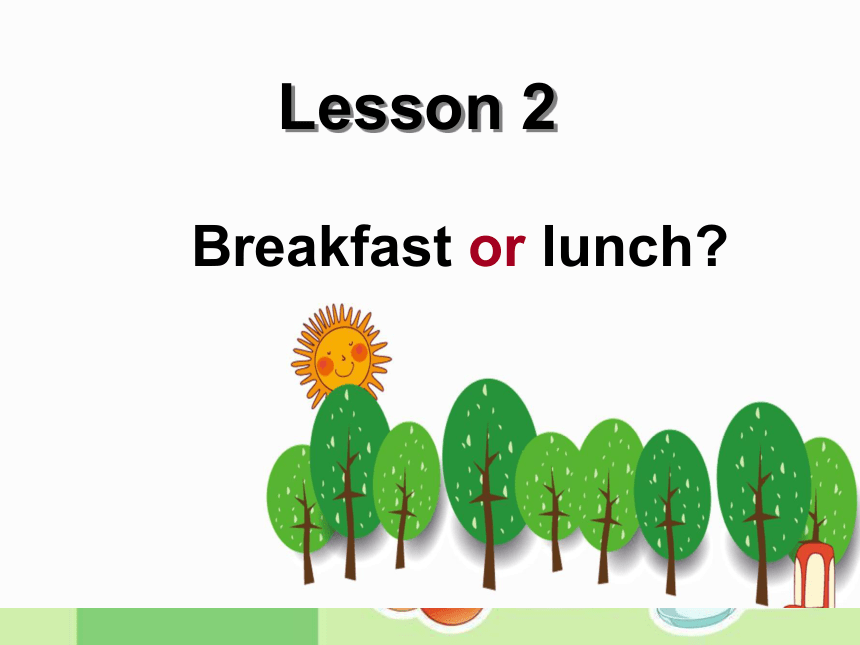 | |
| 格式 | pptx | ||
| 文件大小 | 1.3MB | ||
| 资源类型 | 教案 | ||
| 版本资源 | 新概念英语 | ||
| 科目 | 英语 | ||
| 更新时间 | 2024-07-30 10:07:36 | ||
图片预览

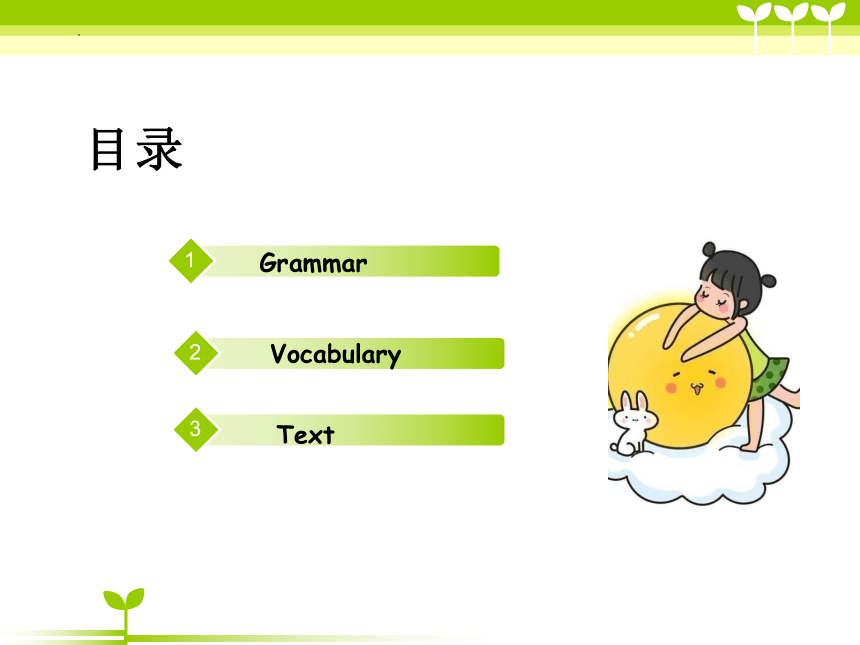
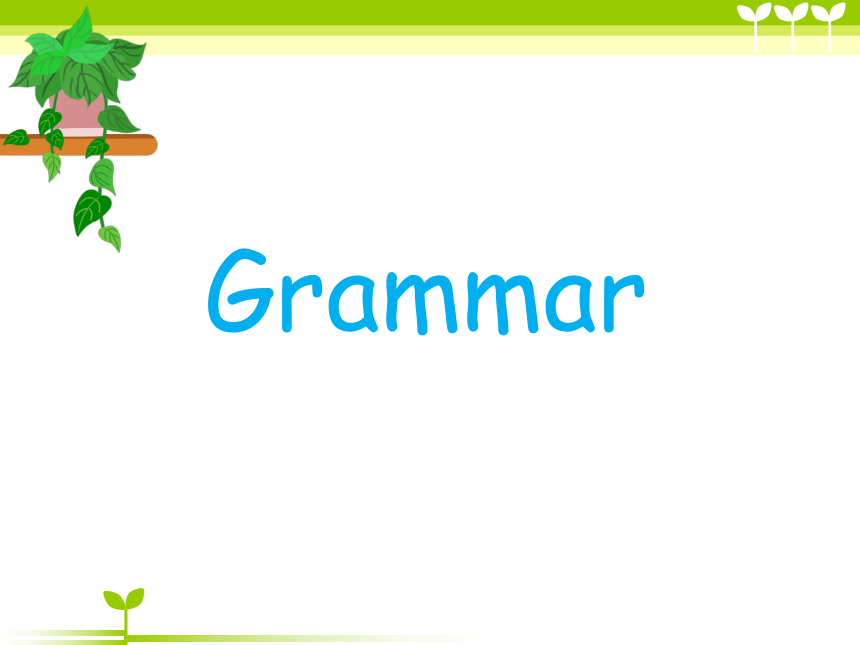
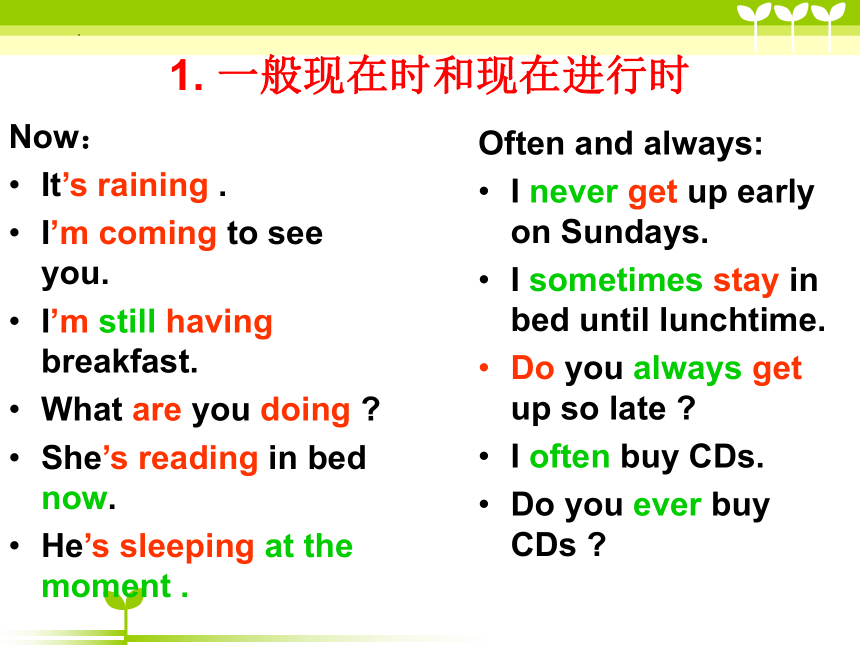
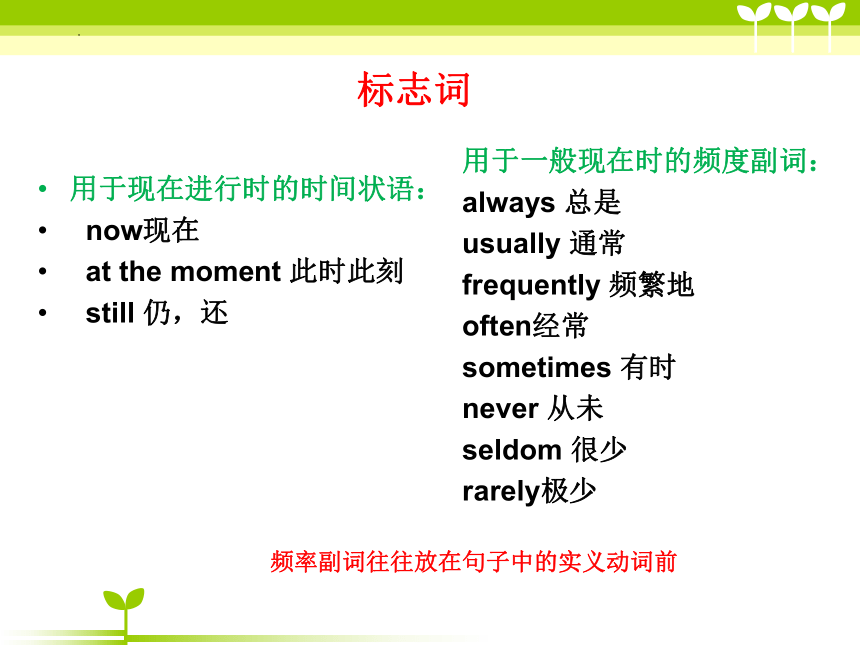
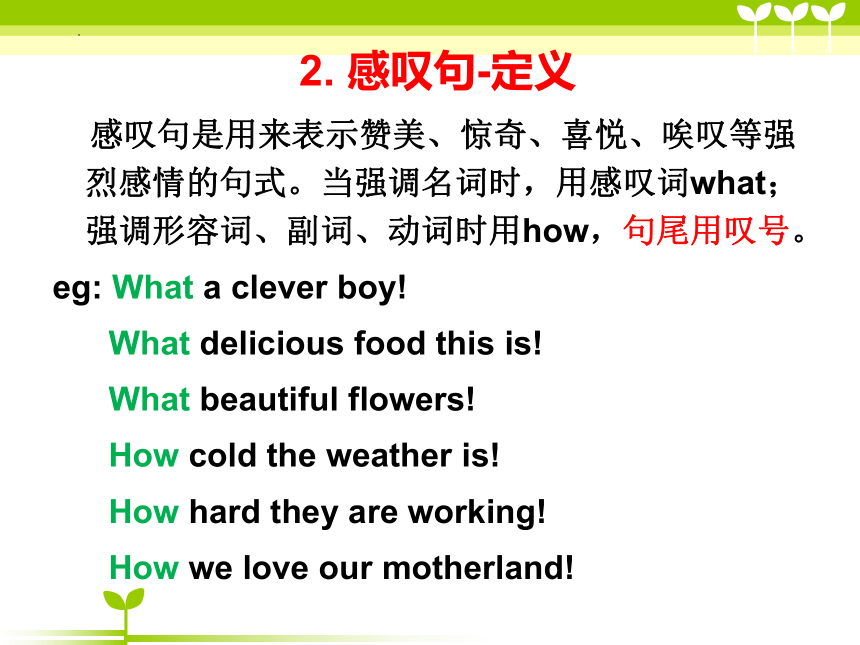
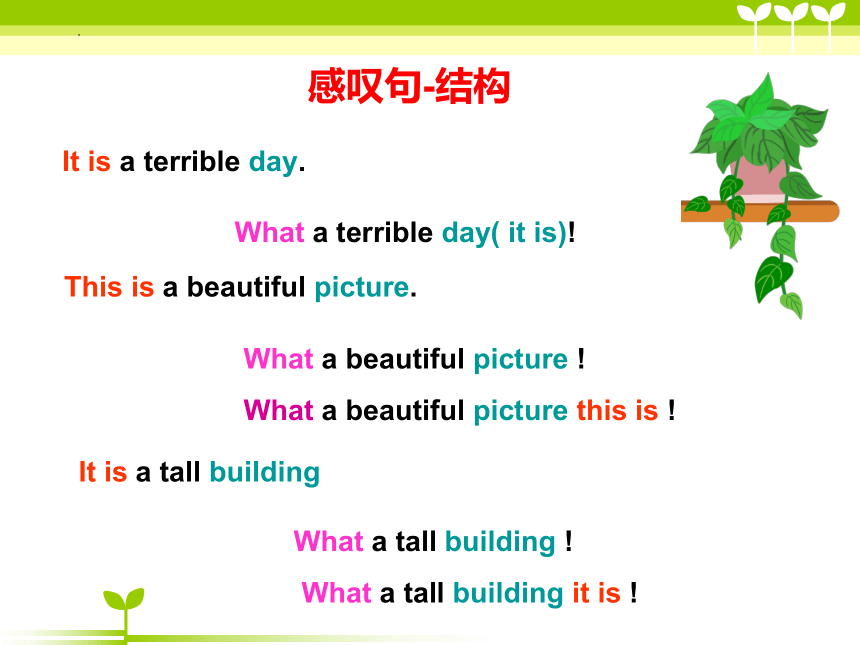
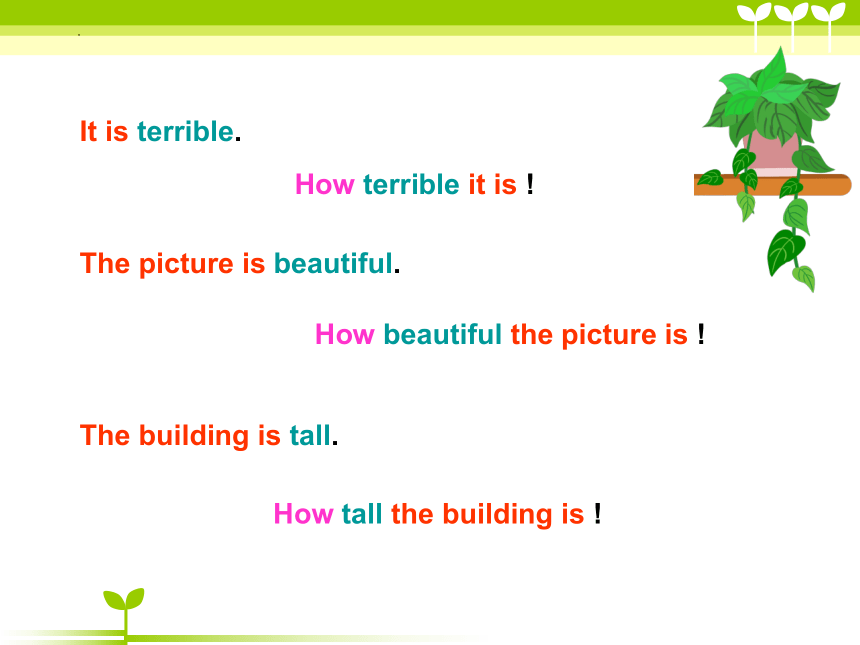
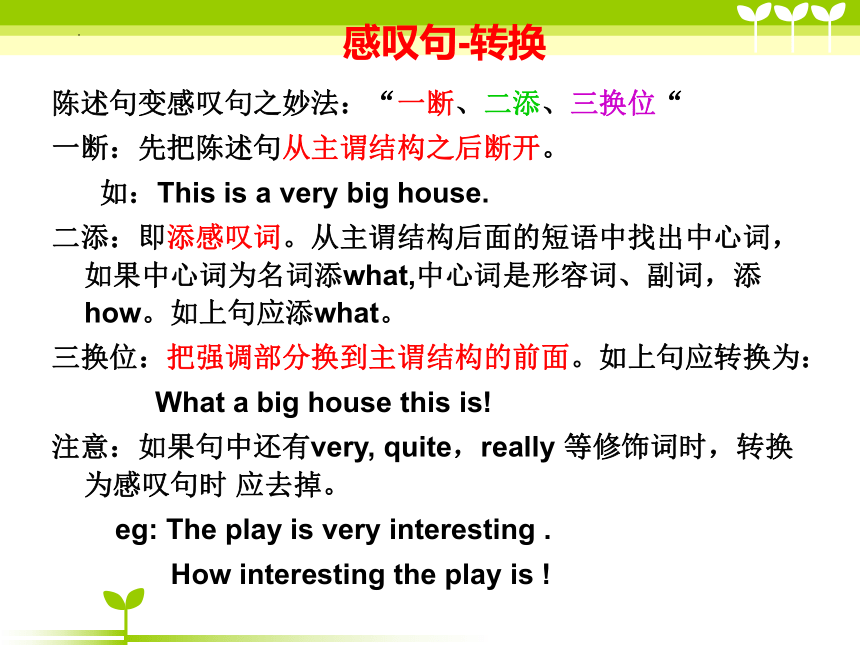
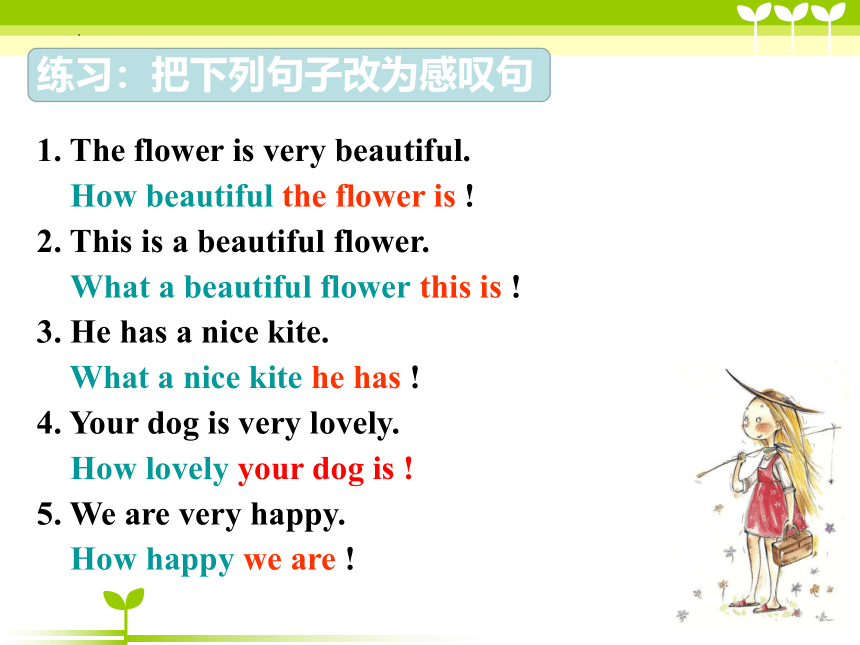
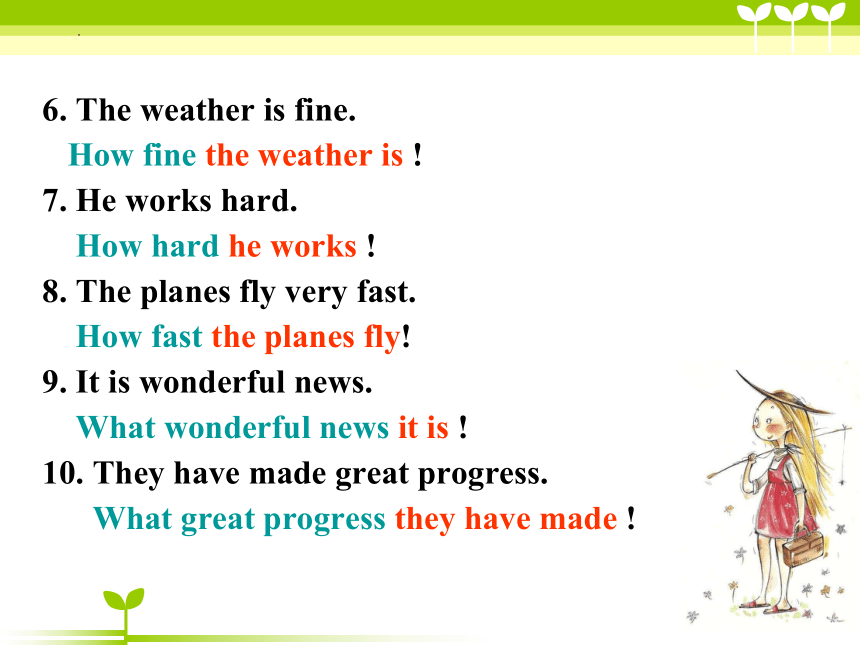
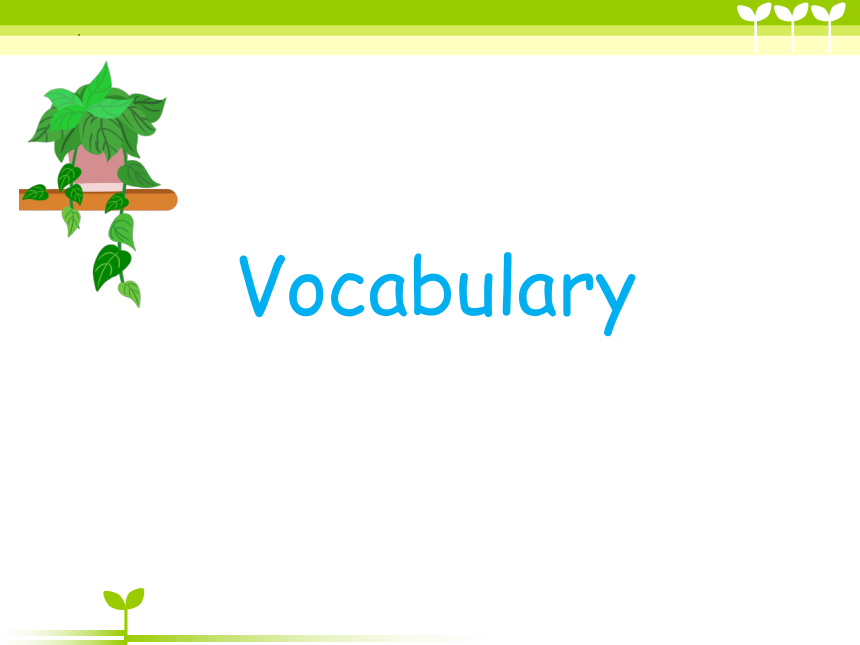
文档简介
(共35张PPT)
Lesson 2
Breakfast or lunch
Grammar
1
Vocabulary
2
Text
3
目录
Grammar
1. 一般现在时和现在进行时
Now:
It’s raining .
I’m coming to see you.
I’m still having breakfast.
What are you doing
She’s reading in bed now.
He’s sleeping at the moment .
Often and always:
I never get up early on Sundays.
I sometimes stay in bed until lunchtime.
Do you always get up so late
I often buy CDs.
Do you ever buy CDs
标志词
用于现在进行时的时间状语:
now现在
at the moment 此时此刻
still 仍,还
用于一般现在时的频度副词:
always 总是
usually 通常
frequently 频繁地
often经常
sometimes 有时
never 从未
seldom 很少
rarely极少
频率副词往往放在句子中的实义动词前
感叹句是用来表示赞美、惊奇、喜悦、唉叹等强烈感情的句式。当强调名词时,用感叹词what;强调形容词、副词、动词时用how,句尾用叹号。
eg: What a clever boy!
What delicious food this is!
What beautiful flowers!
How cold the weather is!
How hard they are working!
How we love our motherland!
2. 感叹句-定义
感叹句-结构
It is a terrible day.
What a terrible day( it is)!
This is a beautiful picture.
What a beautiful picture !
What a beautiful picture this is !
It is a tall building
What a tall building !
What a tall building it is !
How beautiful the picture is !
It is terrible.
How terrible it is !
The picture is beautiful.
How tall the building is !
The building is tall.
陈述句变感叹句之妙法:“一断、二添、三换位“
一断:先把陈述句从主谓结构之后断开。
如:This is a very big house.
二添:即添感叹词。从主谓结构后面的短语中找出中心词,如果中心词为名词添what,中心词是形容词、副词,添how。如上句应添what。
三换位:把强调部分换到主谓结构的前面。如上句应转换为:
What a big house this is!
注意:如果句中还有very, quite,really 等修饰词时,转换为感叹句时 应去掉。
eg: The play is very interesting .
How interesting the play is !
感叹句-转换
练习:把下列句子改为感叹句
1. The flower is very beautiful.
How beautiful the flower is !
2. This is a beautiful flower.
What a beautiful flower this is !
3. He has a nice kite.
What a nice kite he has !
4. Your dog is very lovely.
How lovely your dog is !
5. We are very happy.
How happy we are !
6. The weather is fine.
How fine the weather is !
7. He works hard.
How hard he works !
8. The planes fly very fast.
How fast the planes fly!
9. It is wonderful news.
What wonderful news it is !
10. They have made great progress.
What great progress they have made !
Vocabulary
Discussion
1.Do you get up early every day
2.What time do you usually get up every day
3.Do you find it easy or difficult to get up?
4.What do you usually have for breakfast
What do people in England usually have for breakfast
or
steamed bun
Remember in your heart. 请记住哦!
Breakfast is the most
important in the
three meals.
Do you get up early or late on Sundays
Today I will tell you a story about a man who always gets up late on Sundays. Now let’s listen.
Practice reading
Read the text and answer questions
Q1: What was the weather like last Sunday
It was raining.
Q2: Who was coming to the writer
His aunt.
Q3: Why was the writer’s aunt surprised
It’s one o’clock. He was still having breakfast.
【New words and expressions】
1
2
outside adv. 外面
3
ring v. (铃、电话等)响
4
repeat v. 重复
5
aunt n. 姑,姨,婶,舅母
until prep. 直到
★until prep.直到
until用于表示动作、状态等的持续,可译为“一直到……为止”或“在……以前”。
1、在肯定句中,它与表示持续性状态的动词连用,表示某动作持续到某一时刻:
我会在这里等到5点钟。
I’ll wait here until 5.
直到他回来为止,他爸爸都是活着的。
His father was alive until he came back.
2、在否定句中,它通常与描述短暂动作的动词连用,表示“到……为止”、“直到……才”:
她到6点才能来。
She cannot arrive until 6.
直到他回来,他爸爸才死。
His father didn't die until he came back.
I stay in bed until lunch time.
(肯定句中持续性动词)
= I don’t get up until lunch time.
(否定句中瞬间动词)
★outside
1. adv. 外面(作状语)
他正在外面等我。
He is waiting for me outside.
外面很冷。
It is cold outside.
2. n. 外面
门从外面上了锁。
The door was locked from the outside.
3. adj. 外面的
如果你打外线电话就需要付费。
You have to pay to make outside calls.
★ring(rang. rung)
1. vt. 鸣,(铃、电话等)响(往往是提醒人做某事)
每天早上表都在六点钟响。
Every morning the clock rings at 6.
电话/门铃响了。
The telephone(door bell) is ringing.
2. vt. 打电话给(美语中用call)
明天我会给你打电话。
Tomorrow I'll ring you.
3. n. (打)电话 give sb. a ring
记得明天给我打电话。
Remember to give me a ring. /Remember to ring me.
4. n. 戒指
他给了她一个钻石戒指作为生日礼物。
He gives her a diamond ring as a birthday present.
★ aunt n. 姑,姨,婶,舅妈
所有长一辈的女性都用这个称呼
男性则是uncle: 叔叔
他们的孩子:cousin 堂兄妹(不分男女)
cousin的孩子:nephew 外甥,侄子
niece 外甥女,侄女
★repeat v. 重复
1. vt. 重复
你能重复最后一个词吗?
Will you repeat the last word
跟著我念这些句子。
Repeat these sentences after me.
2. vi. 重做,重说
她只是反覆地做同样的事。
She did nothing but repeated.
★ It was Sunday.那是个星期天
It is hot today.今天挺热的。
It is 12 o’clock now.现在12点。
It is me.是我。
It
被
称
为
虚
主
语
it指时间、天气、温度或距离,也可以指
一件东西、一件事件或用来指是什么人 。
on Sundays: 所有的星期天,每逢星期天,与一般现在时连用,表示经常性的行为。
介词on一般用于表示某一天的时间短语中:on Monday,on Monday morning,on that day
当使用last,next,this,that时,介词(以及定冠词)必须省略:
我下周(这周)来见你。
I’ll see you next/this week.
★ I never get up early on Sundays
on
所有的星期天,每逢星期天
与一般现在时连用,表示经常性的行为
I often go shopping on Sundays.
He sometimes swims on Sundays.
Sundays
It’s time for bed now.
现在该睡觉了。
You must stay in bed for another two days.
你必须再卧床两天。
★ I sometimes stay in bed until lunchtime.
有时我要一直躺到吃午饭的时候
在表达卧床时,bed前不需加冠词
bed
★ What a day! 鬼天气!
what引导的感叹句 :
What a pretty girl (she is)!
多漂亮的女孩啊!
What a smart boy (he is) !
多机灵的男孩啊!
What a wonderful movie (it is) !
多精彩的电影啊!
What +a/an (+adj.) +n.(+主语+谓语)!
有时形容词被省略:
What a thing to say! 多么难听的话啊!
What a day! 鬼天气!
这种情况常表示批评或不好的意思,
往往需要上下文和一定的语境来确定其意义。
★ I've just arrived by train
by air 乘飞机
by bike 骑自行车
by boat 乘船
by bus 乘公共汽车
by 直接加交通工具
by car 乘小汽车by land 由陆路
by plane 乘飞机
by sea 由海路
by ship 乘船
by train 乘火车
如果是特指的交通工具,则要加
冠词或其他限定词:
My aunt left by the 9:15 train.
我阿姨坐9:15的火车离开的。
★ I’m coming to see you.我将要来看你.
进行时态 be coming ,表示将来,表
示近期按计划或安排要进行的动作。
I’m leaving.
His father is dying.
Tom is going to school.
同样用法的动词有:go,come,leave,arrive,land,meet,die,start,return,join…
【 HOMEWORK 】
1
Copy the new words and expressions
2
3
Recite the text
Do the exercises
Lesson 2
Breakfast or lunch
Grammar
1
Vocabulary
2
Text
3
目录
Grammar
1. 一般现在时和现在进行时
Now:
It’s raining .
I’m coming to see you.
I’m still having breakfast.
What are you doing
She’s reading in bed now.
He’s sleeping at the moment .
Often and always:
I never get up early on Sundays.
I sometimes stay in bed until lunchtime.
Do you always get up so late
I often buy CDs.
Do you ever buy CDs
标志词
用于现在进行时的时间状语:
now现在
at the moment 此时此刻
still 仍,还
用于一般现在时的频度副词:
always 总是
usually 通常
frequently 频繁地
often经常
sometimes 有时
never 从未
seldom 很少
rarely极少
频率副词往往放在句子中的实义动词前
感叹句是用来表示赞美、惊奇、喜悦、唉叹等强烈感情的句式。当强调名词时,用感叹词what;强调形容词、副词、动词时用how,句尾用叹号。
eg: What a clever boy!
What delicious food this is!
What beautiful flowers!
How cold the weather is!
How hard they are working!
How we love our motherland!
2. 感叹句-定义
感叹句-结构
It is a terrible day.
What a terrible day( it is)!
This is a beautiful picture.
What a beautiful picture !
What a beautiful picture this is !
It is a tall building
What a tall building !
What a tall building it is !
How beautiful the picture is !
It is terrible.
How terrible it is !
The picture is beautiful.
How tall the building is !
The building is tall.
陈述句变感叹句之妙法:“一断、二添、三换位“
一断:先把陈述句从主谓结构之后断开。
如:This is a very big house.
二添:即添感叹词。从主谓结构后面的短语中找出中心词,如果中心词为名词添what,中心词是形容词、副词,添how。如上句应添what。
三换位:把强调部分换到主谓结构的前面。如上句应转换为:
What a big house this is!
注意:如果句中还有very, quite,really 等修饰词时,转换为感叹句时 应去掉。
eg: The play is very interesting .
How interesting the play is !
感叹句-转换
练习:把下列句子改为感叹句
1. The flower is very beautiful.
How beautiful the flower is !
2. This is a beautiful flower.
What a beautiful flower this is !
3. He has a nice kite.
What a nice kite he has !
4. Your dog is very lovely.
How lovely your dog is !
5. We are very happy.
How happy we are !
6. The weather is fine.
How fine the weather is !
7. He works hard.
How hard he works !
8. The planes fly very fast.
How fast the planes fly!
9. It is wonderful news.
What wonderful news it is !
10. They have made great progress.
What great progress they have made !
Vocabulary
Discussion
1.Do you get up early every day
2.What time do you usually get up every day
3.Do you find it easy or difficult to get up?
4.What do you usually have for breakfast
What do people in England usually have for breakfast
or
steamed bun
Remember in your heart. 请记住哦!
Breakfast is the most
important in the
three meals.
Do you get up early or late on Sundays
Today I will tell you a story about a man who always gets up late on Sundays. Now let’s listen.
Practice reading
Read the text and answer questions
Q1: What was the weather like last Sunday
It was raining.
Q2: Who was coming to the writer
His aunt.
Q3: Why was the writer’s aunt surprised
It’s one o’clock. He was still having breakfast.
【New words and expressions】
1
2
outside adv. 外面
3
ring v. (铃、电话等)响
4
repeat v. 重复
5
aunt n. 姑,姨,婶,舅母
until prep. 直到
★until prep.直到
until用于表示动作、状态等的持续,可译为“一直到……为止”或“在……以前”。
1、在肯定句中,它与表示持续性状态的动词连用,表示某动作持续到某一时刻:
我会在这里等到5点钟。
I’ll wait here until 5.
直到他回来为止,他爸爸都是活着的。
His father was alive until he came back.
2、在否定句中,它通常与描述短暂动作的动词连用,表示“到……为止”、“直到……才”:
她到6点才能来。
She cannot arrive until 6.
直到他回来,他爸爸才死。
His father didn't die until he came back.
I stay in bed until lunch time.
(肯定句中持续性动词)
= I don’t get up until lunch time.
(否定句中瞬间动词)
★outside
1. adv. 外面(作状语)
他正在外面等我。
He is waiting for me outside.
外面很冷。
It is cold outside.
2. n. 外面
门从外面上了锁。
The door was locked from the outside.
3. adj. 外面的
如果你打外线电话就需要付费。
You have to pay to make outside calls.
★ring(rang. rung)
1. vt. 鸣,(铃、电话等)响(往往是提醒人做某事)
每天早上表都在六点钟响。
Every morning the clock rings at 6.
电话/门铃响了。
The telephone(door bell) is ringing.
2. vt. 打电话给(美语中用call)
明天我会给你打电话。
Tomorrow I'll ring you.
3. n. (打)电话 give sb. a ring
记得明天给我打电话。
Remember to give me a ring. /Remember to ring me.
4. n. 戒指
他给了她一个钻石戒指作为生日礼物。
He gives her a diamond ring as a birthday present.
★ aunt n. 姑,姨,婶,舅妈
所有长一辈的女性都用这个称呼
男性则是uncle: 叔叔
他们的孩子:cousin 堂兄妹(不分男女)
cousin的孩子:nephew 外甥,侄子
niece 外甥女,侄女
★repeat v. 重复
1. vt. 重复
你能重复最后一个词吗?
Will you repeat the last word
跟著我念这些句子。
Repeat these sentences after me.
2. vi. 重做,重说
她只是反覆地做同样的事。
She did nothing but repeated.
★ It was Sunday.那是个星期天
It is hot today.今天挺热的。
It is 12 o’clock now.现在12点。
It is me.是我。
It
被
称
为
虚
主
语
it指时间、天气、温度或距离,也可以指
一件东西、一件事件或用来指是什么人 。
on Sundays: 所有的星期天,每逢星期天,与一般现在时连用,表示经常性的行为。
介词on一般用于表示某一天的时间短语中:on Monday,on Monday morning,on that day
当使用last,next,this,that时,介词(以及定冠词)必须省略:
我下周(这周)来见你。
I’ll see you next/this week.
★ I never get up early on Sundays
on
所有的星期天,每逢星期天
与一般现在时连用,表示经常性的行为
I often go shopping on Sundays.
He sometimes swims on Sundays.
Sundays
It’s time for bed now.
现在该睡觉了。
You must stay in bed for another two days.
你必须再卧床两天。
★ I sometimes stay in bed until lunchtime.
有时我要一直躺到吃午饭的时候
在表达卧床时,bed前不需加冠词
bed
★ What a day! 鬼天气!
what引导的感叹句 :
What a pretty girl (she is)!
多漂亮的女孩啊!
What a smart boy (he is) !
多机灵的男孩啊!
What a wonderful movie (it is) !
多精彩的电影啊!
What +a/an (+adj.) +n.(+主语+谓语)!
有时形容词被省略:
What a thing to say! 多么难听的话啊!
What a day! 鬼天气!
这种情况常表示批评或不好的意思,
往往需要上下文和一定的语境来确定其意义。
★ I've just arrived by train
by air 乘飞机
by bike 骑自行车
by boat 乘船
by bus 乘公共汽车
by 直接加交通工具
by car 乘小汽车by land 由陆路
by plane 乘飞机
by sea 由海路
by ship 乘船
by train 乘火车
如果是特指的交通工具,则要加
冠词或其他限定词:
My aunt left by the 9:15 train.
我阿姨坐9:15的火车离开的。
★ I’m coming to see you.我将要来看你.
进行时态 be coming ,表示将来,表
示近期按计划或安排要进行的动作。
I’m leaving.
His father is dying.
Tom is going to school.
同样用法的动词有:go,come,leave,arrive,land,meet,die,start,return,join…
【 HOMEWORK 】
1
Copy the new words and expressions
2
3
Recite the text
Do the exercises
同课章节目录
